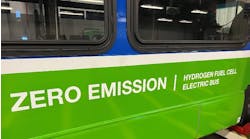Metro Vancouver Mayors’ Council calls on senior Canadian governments to fund TransLink’s immediate climate action
TransLink’s aggressive roll-out option of its Low Carbon Fleet Strategy has been endorsed by the Mayors’ Council on Regional Transportation in Metro Vancouver.
This schedule will see half of all TransLink’s diesel fleet converted to battery electric by 2030 and the remainder before 2050.
This option represents the fastest possible turn-over of the fleet to battery electric buses without retiring existing buses early. It also achieves maximum greenhouse gas (GHG) reductions over the next 10 years. The plan calls for:
- Incremental capital investment of C$447 million (US$334.143 million) over and above the funding already secured and approved for conventional buses.
- Open new Marpole Transit Center as 100 percent depot charging with 280 chargers.
- Expand an existing transit center to accommodate electric buses.
- Convert route 100 and other routes to full electric operation by installing on-route chargers.
- Purchase 635 battery electric buses.
- Including trolleys, 64 percent of transit buses electrified by 2030.
- 2030 bus fleet GHG reduced by 44 percent compared to 2007.
- Cost parity between battery electric and conventional fleets only achieved over the full lifecycle of the buses (15-20 years) due to the high upfront costs of installing recharging infrastructure.
TransLink says this plan will only be possible with financial support from senior governments. Mayors are requesting C$447 million (US$334.143 million) in provincial and federal funding over 10 years to implement the strategy, with investment required by early 2021 to deliver the strategy as scheduled. This funding must be separate from investments in transit system expansion found in Phase Three Plan of the 10-Year Vision so that the climate change benefits of both strategies can be maximized, according to TransLink.
In October 2018, the Mayors’ Council and the TransLink Board of Directors approved new environmental targets: Reduce greenhouse gas emissions by 80 percent and use only renewable energy in all operations by 2050. Metro Vancouver Regional District has committed to reducing its GHG emissions by 45 percent by 2030.
Mayors’ Council Chair and New Westminster Mayor Jonathan Coté says the region will not reach its targets without this investment.
“Transitioning the bus fleet to zero-emissions technology is an essential step, alongside continued expansion of transit service,” said Coté. “Right now, TransLink is procuring new buses. If we buy internal combustion engines, they will be on the roads for over 15 years, dashing our chances of achieving meaningful GHG reduction from our own operations. The Low Carbon Fleet Strategy allows us to seize the opportunity and start the shift this year, but we need provincial and federal help to do it.”
The Mayors’ Council will continue working with provincial and federal leaders to make funding for the strategy, as well as for the Phase Three Plan of the 10-Year Vision scheduled for approval in early 2021, a priority.



